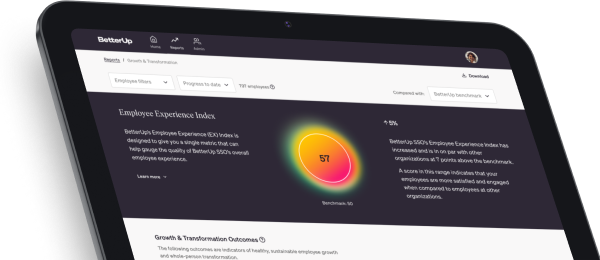-
EN - US
EN - US
-
For Business
For Business
How it works
Platform OverviewTransform your enterprise with the scalable mindsets, skills, & behavior change that drive performance.
IntegrationsExplore how BetterUp connects to your core business systems.
Powered by AIWe pair AI with the latest in human-centered coaching to drive powerful, lasting learning and behavior change.
Products
BetterUp Lead™Build leaders that accelerate team performance and engagement.
BetterUp Manage™Unlock performance potential at scale with AI-powered curated growth journeys.
BetterUp Care®Build resilience, well-being and agility to drive performance across your entire enterprise.
Solutions
Sales PerformanceTransform your business, starting with your sales leaders.
ExecutiveUnlock business impact from the top with executive coaching.
Diversity & InclusionFoster a culture of inclusion and belonging.
GovernmentAccelerate the performance and potential of your agencies and employees.
Customers
Case StudiesSee how innovative organizations use BetterUp to build a thriving workforce.
Why BetterUp?Discover how BetterUp measurably impacts key business outcomes for organizations like yours.
-
For Individuals
For Individuals
What is coaching?
About CoachingLearn how 1:1 coaching works, who its for, and if it's right for you.
Find your CoachAccelerate your personal and professional growth with the expert guidance of a BetterUp Coach.
Types of Coaching
Career CoachingNavigate career transitions, accelerate your professional growth, and achieve your career goals with expert coaching.
Communications CoachingEnhance your communication skills for better personal and professional relationships, with tailored coaching that focuses on your needs.
Life CoachingFind balance, resilience, and well-being in all areas of your life with holistic coaching designed to empower you.
-
Resources
Resources
Library
Courageous leadership developmentResearch, expert insights, and resources to develop courageous leaders within your organization.
Guides & ReportsBest practices, research, and tools to fuel individual and business growth.
EventsView on-demand BetterUp events and learn about upcoming live discussions.
Blog
BetterUp BlogThe latest insights and ideas for building a high-performing workplace.
BetterUp Briefing
BetterUp BriefingThe online magazine that helps you understand tomorrow's workforce trends, today.
Research
BetterUp LabsInnovative research featured in peer-reviewed journals, press, and more.
Center for Purpose & PerformanceFounded in 2022 to deepen the understanding of the intersection of well-being, purpose, and performance
- About
-
For Business
How it works
Platform OverviewTransform your enterprise with the scalable mindsets, skills, & behavior change that drive performance.
IntegrationsExplore how BetterUp connects to your core business systems.
Powered by AIWe pair AI with the latest in human-centered coaching to drive powerful, lasting learning and behavior change.
Products
BetterUp Lead™Build leaders that accelerate team performance and engagement.
BetterUp Manage™Unlock performance potential at scale with AI-powered curated growth journeys.
BetterUp Care®Build resilience, well-being and agility to drive performance across your entire enterprise.
Solutions
Sales PerformanceTransform your business, starting with your sales leaders.
ExecutiveUnlock business impact from the top with executive coaching.
Diversity & InclusionFoster a culture of inclusion and belonging.
GovernmentAccelerate the performance and potential of your agencies and employees.
-
For Individuals
What is coaching?
About CoachingLearn how 1:1 coaching works, who its for, and if it's right for you.
Find your CoachAccelerate your personal and professional growth with the expert guidance of a BetterUp Coach.
Types of Coaching
Career CoachingNavigate career transitions, accelerate your professional growth, and achieve your career goals with expert coaching.
Communications CoachingEnhance your communication skills for better personal and professional relationships, with tailored coaching that focuses on your needs.
Life CoachingFind balance, resilience, and well-being in all areas of your life with holistic coaching designed to empower you.
-
Resources
Library
Courageous leadership developmentResearch, expert insights, and resources to develop courageous leaders within your organization.
Guides & ReportsBest practices, research, and tools to fuel individual and business growth.
EventsView on-demand BetterUp events and learn about upcoming live discussions.
- About




-1.png)

22f1.png?width=1596&height=1402&name=1%20(1).png)

 With these four pillars as your guide, how might you see a culture of coaching in your organization?
With these four pillars as your guide, how might you see a culture of coaching in your organization?